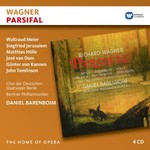
Parsifal (Complete Opera recorded in 1991)
 $40.00
Special Order
$40.00
Special Order3 - 6 weeks add to cart
WAGNER
Parsifal (Complete Opera recorded in 1991)
Waltraud Meier, Siegfried Jerusalem, Jose Van Dam, John tomlinson / Berlin Philharmonic Orchestra, Daniel Barenboim
[ Warner Classics Home of Opera / 4 CD Box Set ]
Release Date: Friday 20 May 2016
This item is only available to us via Special Order. We should be able to get it to you in 3 - 6 weeks from when you order it.
"For a studio performance my vote would go now-just-to the new version, largely on the strength of the recording and the performances of Meier and Jerusalem.
(Gramophone)
Barenboim is always most impressively heard in works of the grandest, most soul-searching kind - and he meets splendidly this most formidable challenge of all," wrote Gramophone when this Parsifal, recorded in the famous Jesus-Christus Kirche with the Berlin Philharmonic Orchestra, was released in 1991. Siegfried Jerusalem is golden-toned in the title role, Waltraud Meier proves why she was the defining Kundry of her era and, as Amfortas, José van Dam suffers with the utmost nobility.
"Parsifal always brings out the very best in its interpreters, and this new version is no exception. Barenboim is always most impressively heard in works of the grandest, most soul-searching kind-witness his fine Bruckner (see page 76)-and he meets splendidly this most formidable challenge of all. He empathizes with the internal agonies of the principal characters and charts their development, especially Parsifal's and Kundry's, with unerring fidelity to Wagner's intentions, superbly supported by the orchestra and the recording. The Berlin Philharmonic plays for him with even greater weight and grandeur than it gave to Karajan's Gramophone Award-winning set (DG) in striving towards the spiritual essence of the work, while also attending to the textural beauty of the piece. I don't think I have ever heard certain passages, particularly the more reflective ones, suffused with so much sensuousness, and together conductor and orchestra sustain the line through even the most complex passages of contrapuntal writing. Here they emerge more clearly than on previous recordings. Whereas the Karajan had some quirks of balance and level, here the engineers seem to have got everything right.
Barenboim does sometimes indulge his penchant for slowing down unnecessarily in the cause of extra expression, particularly in Amfortas's two tormented monologues. In the second, the conductor has so becalmed himself that when Wagner actually writes sehr langsam, Barenboim simply cannot go any slower without letting the music fall apart. Elsewhere his speeds seem absolutely right, and overall his timing is exactly the same as Karajan's, which is only four minutes slower than Knappertsbusch's (Philips). All three are to be vastly preferred to Levine's (also Philips) lethargic tread through the work, not much admired by AW in his review.
As AW commented, Waltraud Meier suffered severely from Levine's unduly slow "Ich sah das Kind". Barenboim paces it ideally, as he does the long confrontation with Parsifal that succeeds it. Where in both her previous recordings of Kundry, for Goodall and Levine, Meier sounded a trifle light, here she offers what I have no hesitation in saying is the most arrestingly incisive, best sung Kundry in any set. Inspired by Barenboim, her imprecations against Parsifal when her designs are thwarted are quite thrilling in their precision, the high Bs thrown out fearlessly. She is matched by the most satisfying Parsifal to date on disc in Siegfried Jerusalem, whose rightly detached reading in Act 1 grows through playfulness with the excellent Flower Maidens and anger in Act 2 to the intense emotions of Act 3. His tone is blessedly golden and steady throughout, so that phrase after phrase achieves an ideal one has up to now had only in one's mind.
As for Karajan, van Dam is an eloquent Amfortas, not as overtly searing as London (Knappertsbuch), but more vocally sound than Estes (Levine). On the whole he is more involved here than for Karajan. Von Kannen is a Klingsor in the Uhde class-bitingly malevolent, vocally secure. The disappointment here is the Gurnemanz. Holle cannot equal the vocal warmth of Moll (Karajan) or the interpretative insights of Hotter (Knappertsbusch). Nor can he match the authority of either, although he comes near it in the Coronation and Good Friday Music of Act 3, perhaps inspired by Barenboim. I do not mean to suggest he is inadequate-there is obviously a wealth of experience behind his reading-merely that it isn't quite of the outstanding calibre of his colleagues' contributions. Tomlinson is impressive in Titurel's brief utterances and they have been recorded at just the right distance.
Similar care has been taken in balancing the chorus with the orchestra, advantage being taken of the rewarding acoustics of the Jesus Christus Kirche in Berlin. The choral singing itself matches that on the Karajan, and Knappertsbusch and Levine Bayreuth sets: praise enough. For a studio performance my vote would go now-just-to the new version over the Karajan, largely on the strength of the recording and the performances of Meier and Jerusalem, while the Knappertsbusch remains, as it always will, hors concours, a very special performance unlikely to be repeated."
(Gramophone)

